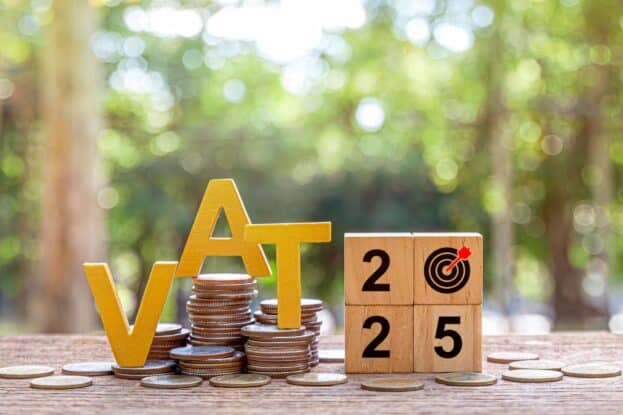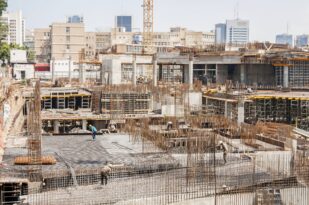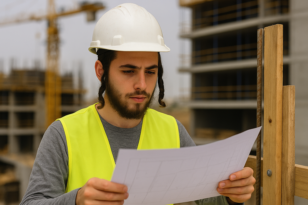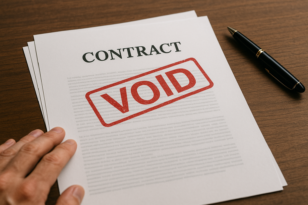Adding to the real estate sector turbulence—including interest rate hikes, war, and labor crises—the industry will face another challenge starting January 1, 2025: an increase in VAT from 17% to 18%. While seemingly minor, industry leaders warn of significant repercussions beyond the addition of tens of thousands of shekels to prices. Should payments be advanced, and will the second-hand apartment market also be affected?
by Dror Nir Kastel, Nadlan Center
If the turbulence in the real estate sector over the past two years, including rising interest rates, the outbreak of war, labor shortages, and commodity crises, weren’t enough, starting January 1, the sector will face another challenge: an increase in VAT from 17% to 18%. It seems like a minor addition of less than one percent to the price of new apartments. Still, according to senior industry officials, the step could have significant implications.
Attorney Raquel Shinwald, a partner at Meir Mizrahi & Co. specializing in VAT issues, says, “The VAT increase is expected to impact housing prices significantly, particularly the prices of new apartments from contractors. This adds another increase to already soaring housing prices. The price offered to the buyer includes VAT. Suppose an apartment costs three million shekels. This price inherently includes VAT. Once VAT increases, housing prices will automatically increase by at least the rate of the VAT hike.”
Another surprising detail she mentions is the potential impact on tens of thousands of buyers who took advantage of contractors’ financing campaigns, such as 20/80 or 10/90 models: “The VAT increase may apply to transactions for new apartments signed before the law takes effect. Payments in the past were made according to the pace of construction progress. Today, we see campaigns where 20% is paid upon signing the contract, and the remainder is paid upon delivery, sometimes with the initial payment being just 10% or 7%.”
“When buyers pay only a small percentage of the sum at contract signing and the rest upon occupancy, they might pay 17% VAT on the down payment. However, when the remaining 80% or 90% is completed, the VAT rate will reflect the new rate. People are often unaware that their apartments might become more expensive due to the VAT increase, adding tens of thousands of shekels. Currently, we are discussing a VAT increase from 17% to 18%, but if there are further increases, buyers could be exposed to those as well. Essentially, anyone deferring their payments into the future is vulnerable to additional costs they might have yet to anticipate. Most contractor agreements now include a clause that states that VAT increases will be passed on to the buyer.”
Does this mean buyers should advance payments?
“Not necessarily, because even if someone advances payments now, most buyers take out mortgages. With current high interest rates, it might not be financially viable for them to take out a loan to complete payments to the developer and save on the VAT increase. Every buyer must evaluate their situation to determine if they can advance payments without taking a high-interest loan. Advancing payments now could save tens of thousands of shekels from the VAT increase if they can. However, if advancing payments requires a high-interest mortgage, it might not be worth it—it might be better to stay in the financing plan and complete payments upon occupancy.”
It’s not just new apartments: second-hand apartments are expected to become more expensive
According to Shinwald, the impact of the VAT increase isn’t limited to new apartments; it will also affect the second-hand market. Over time, second-hand apartments align with overall market prices. Therefore, in the future, we can expect second-hand apartment prices to increase similarly.
Moreover, the supply chain is affected: “There’s a chain of suppliers for whom VAT increases, which ultimately affects the apartment’s price.”
Another area where VAT is expected to impact is combination deals: “This is an example of how the effect goes beyond residential apartments. For instance, I’ve been getting many inquiries about combination deals recently. When a combination agreement is signed, the contractor’s VAT invoice for construction services to build the landowner’s apartments is typically issued when the contractor begins work on the land. Developers ask me, ‘What can we do if we haven’t started construction yet? If we issue the VAT invoice after January 1, it will be 18% instead of 17%. What can we do?’”
“In such cases, developers need to check if they have building permits and if those permits allow them to begin construction. If possible, it’s better to start construction in December rather than January to save that 1% VAT increase.”
What about urban renewal?
“For apartments built under urban renewal programs (Pinui-Binui or Tama 38), VAT is set at 0% for construction services provided to existing apartment owners. However, this exemption only applies within the legal limits—up to an additional 25 square meters beyond the existing apartment size. If the developer stays within these limits, VAT increases won’t significantly impact existing apartment owners. However, the VAT increase will apply for new apartments built under urban renewal programs and sold in the free market, just like any other apartment sold in the free market.”
VAT increase affects even buyers who haven’t completed payments
According to Raz Schreiber, CEO of InHouse, the VAT increase is “an automatic 1% rise in apartment prices, which will be applied across the board because it’s the law. It’s another burden on apartment prices and buyers. We’re already witnessing significant cost increases in the production components of apartments—raw materials, wages, everything. Until now, developers and contractors have absorbed what they could to maintain sales targets. But 2025, we’ll see more aggressive cost increases, independent of demand.”
“It’s not just the apartment price—it’s an additional percentage on all components. We’re seeing significant increases in production costs—raw materials, wages—all rising. Until now, developers and contractors have tried to absorb these costs to meet sales targets. In 2025, I expect further price increases due to these substantial cost hikes, regardless of demand.”
Raz Schreiber
Schreiber adds that buyers who haven’t completed payments are also affected. Any outstanding balance is subject to the new VAT rate. Some buyers are trying to advance payments now to save on the increase.
Do you recommend advancing payments to save before the VAT increase as a marketing company?
“For those who can. Buyers with long occupancy timelines, like four years, typically can’t pay the full amount upfront. But if someone can pay now to save that 1%, I recommend they do so. One percent is a significant amount in real estate transactions.”
Attorney Ziv Caspi, a founding partner of Gindi Caspi & Co., emphasizes that isolating the VAT increase’s impact on the real estate market is challenging due to other variables. “It’s clear that rising apartment prices will lead to reduced demand. It’s also clear that the VAT increase doesn’t align with the national interest of encouraging the economy, particularly the real estate sector.”
Caspi suggests broader government action: “The government needs to boost national morale, reduce interest burdens, and increase foreign labor availability. Currently, there’s significant uncertainty in the execution sector. Concerns about rising prices, labor shortages, and market conditions are reducing construction starts. These issues are far more critical than VAT.”
To summarize, Caspi concludes that while the VAT increase is a burden, it’s unlikely to be a game-changer for the market.

Nadlan Center is Israel’s leading real estate news and knowledge platform in Hebrew, created for industry professionals. Founded by experts in the field, it delivers in-depth, up-to-date coverage on urban renewal, planning and construction, taxation, and housing policy — tailored to the needs of developers, investors, planners, and financiers. In addition to its widely read news content, Nadlan Center hosts major industry events, professional conferences, and training programs that support the growth and development of the Israeli real estate sector.
Learn more: https://www.nadlancenter.co.il







